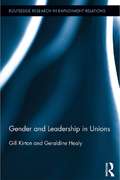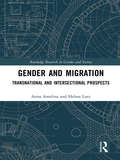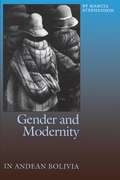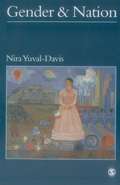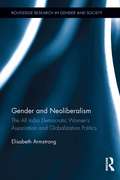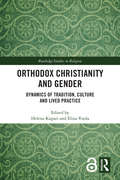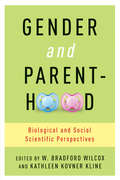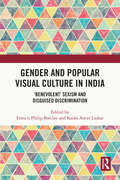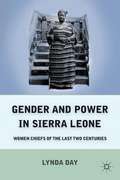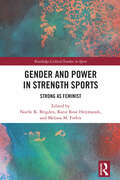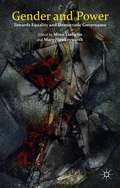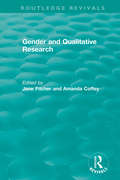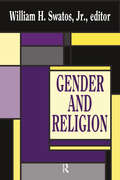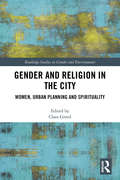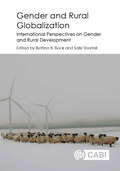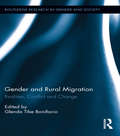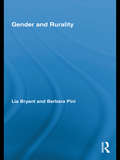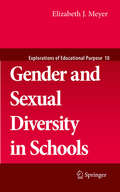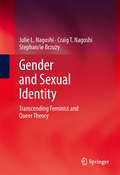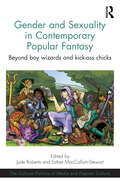- Table View
- List View
Gender and Leadership in Unions (Routledge Research in Employment Relations #30)
by Geraldine Healy Gill KirtonReflecting the increased attention to gender and women in the field of employment relations, there is now a growing international literature on women and trade unions. The interest in women as trade unionists arises partly from the fact that women comprise 40 percent of trade union membership in the USA and over 50 percent in the UK. Further, despite considerable overall union membership decline in both the UK and USA, more women than men are joining unions in both countries. Recognition of the importance of women to the survival and revival of trade union movements has in many cases produced an unprecedented commitment to equality and inclusion at the highest level. Yet the challenge is to ensure that this commitment is translated to action and improves the experience of women in their union and in their workplace. Gender and Leadership in Trade Unions explores and evaluates the similarities and differences in equality strategies pursued by unions in the US and the UK. It assesses the conditions experienced by women union members and how these impact on their leadership, both potential and actual. Women have made gains in both countries within union leadership and decision-making structures, however, climbing the ladder to leadership positions remains far from a smooth process. In the trade union context, women face multiple barriers that resonate with the barriers facing aspiring women leaders in other organizational contexts, including the gendered division of domestic work; the organization and nature of women’s work; the organization and nature of trade union work and the masculine culture of trade unions. The discussion of women trade union leaders is situated more broadly within debates on governance, leadership and democracy within social justice activism.
Gender and Migration: Transnational and Intersectional Prospects (Routledge Research in Gender and Society)
by Helma Lutz Anna AmelinaFrom its beginnings in the 1970s and 1980s, interest towards the topic of gender and migration has grown. Gender and Migration seeks to introduce the most relevant sociological theories of gender relations and migration that consider ongoing transnationalization processes, at the beginning of the third millennium. These include intersectionality, queer studies, social inequality theory and the theory of transnational migration and citizenship; all of which are brought together and illustrated by means of various empirical examples. With its explicit focus on the gendered structures of migration-sending and migration-receiving countries, Gender and Migration builds on the most current conceptual tool of gender studies—intersectionality—which calls for collective research on gender with analysis of class, ethnicity/race, sexuality, age and other axes of inequality in the context of transnational migration and mobility. The book also includes descriptions of a number of recommended films that illustrate transnational migrant masculinities and femininities within and outside of Europe. A refreshing attempt to bring in considerations of gender theory and sexual identity in the area of gender migration studies, this insightful volume will appeal to students and researchers interested in fields such as sociology, social anthropology, political science, intersectional studies and transnational migration.
Gender and Modernity in Andean Bolivia
by Marcia StephensonIn Andean Bolivia, racial and cultural differences are most visibly marked on women, who often still wear native dress and speak an indigenous language rather than Spanish. In this study of modernity in Bolivia, Marcia Stephenson explores how the state's desire for a racially and culturally homogenous society has been deployed through images of womanhood that promote the notion of an idealized, acculturated female body.<P><P>Stephenson engages a variety of texts-critical essays, novels, indigenous testimonials, education manuals, self-help pamphlets, and position papers of diverse women's organizations-to analyze how the interlocking tropes of fashion, motherhood, domestication, hygiene, and hunger are used as tools for the production of dominant, racialized ideologies of womanhood. At the same time, she also uncovers long-standing patterns of resistance to the modernizing impulse, especially in the large-scale mobilization of indigenous peoples who have made it clear that they will negotiate the terms of modernity, but always "as Indians."
Gender and Nation: SAGE Publications (Politics and Culture series #49)
by Nira Yuval-DavisNira Yuval-Davis provides an authoritative overview and critique of writings on gender and nationhood, presenting an original analysis of the ways gender relations affect and are affected by national projects and processes. In Gender and Nation Yuval-Davis argues that the construction of nationhood involves specific notions of both `manhood′ and `womanhood′. She examines the contribution of gender relations to key dimensions of nationalist projects - the nation′s reproduction, its culture and citizenship - as well as to national conflicts and wars, exploring the contesting relations between feminism and nationalism. Gender and Nation is an important contribution to the debates on citizenship, gender and nationhood. It will be essential reading for academics and students of women′s studies, race and ethnic studies, sociology and political science.
Gender and Neoliberalism: The All India Democratic Women’s Association and Globalization Politics (Routledge Research in Gender and Society)
by Elisabeth ArmstrongThis book describes the changing landscape of women’s politics for equality and liberation during the rise of neoliberalism in India. Between 1991 and 2006, the doctrine of liberalization guided Indian politics and economic policy. These neoliberal measures vastly reduced poverty alleviation schemes, price supports for poor farmers, and opened India’s economy to the unpredictability of global financial fluctuations. During this same period, the All India Democratic Women’s Association, which directly opposed the ascendance of neoliberal economics and policies, as well as the simultaneous rise of violent casteism and anti-Muslim communalism, grew from roughly three million members to over ten million. Beginning in the late 1980s, AIDWA turned its attention to women’s lives in rural India. Using a method that began with activist research, the organization developed a sectoral analysis of groups of women who were hardest hit in the new neoliberal order, including Muslim women, and Dalit (oppressed caste) women. AIDWA developed what leaders called inter-sectoral organizing, that centered the demands of the most vulnerable women into the heart of its campaigns and its ideology for social change. Through long-term ethnographic research, predominantly in the northern state of Haryana and the southern state of Tamil Nadu, this book shows how a socialist women’s organization built its oppositional strength by organizing the women most marginalized by neoliberal policies and economics.
Gender and Orthodox Christianity: Dynamics of Tradition, Culture and Lived Practice (Routledge Studies in Religion)
by Elina Vuola Helena KupariThe Orthodox Christian tradition has all too often been sidelined in conversations around contemporary religion. Despite being distinct from Protestantism and Catholicism in both theology and practice, it remains an underused setting for academic inquiry into current lived religious practice. This collection, therefore, seeks to redress this imbalance by investigating modern manifestations of Orthodox Christianity through an explicitly gender-sensitive gaze. By addressing attitudes to gender in this context, it fills major gaps in the literature on both religion and gender. Starting with the traditional teachings and discourses around gender in the Orthodox Church, the book moves on to demonstrate the diversity of responses to those narratives that can be found among Orthodox populations in Europe and North America. Using case studies from several countries, with both large and small Orthodox populations, contributors use an interdisciplinary approach to address how gender and religion interact in contexts such as, iconography, conversion, social activism and ecumenical relations, among others. From Greece and Russia to Finland and the USA, this volume sheds new light on the myriad ways in which gender is manifested, performed, and engaged within contemporary Orthodoxy. Furthermore, it also demonstrates that employing the analytical lens of gender enables new insights into Orthodox Christianity as a lived tradition. It will, therefore, be of great interest to scholars of both Religious Studies and Gender Studies.
Gender and Parenthood: Biological and Social Scientific Perspectives
by W. Bradford Wilcox Kathleen Kovner KlineThe essays in this collection deploy biological and social scientific perspectives to evaluate the transformative experience of parenthood for today's women and men. They map the similar and distinct roles mothers and fathers play in their children's lives and measure the effect of gendered parenting on child well-being, work and family arrangements, and the quality of couples' relationships. Contributors describe what happens to brains and bodies when women become mothers and men become fathers; whether the stakes are the same or different for each sex; why, across history and cultures, women are typically more involved in childcare than men; why some fathers are strongly present in their children's lives while others are not; and how the various commitments men and women make to parenting shape their approaches to paid work and romantic relationships. Considering recent changes in men's and women's familial duties, the growing number of single-parent families, and the impassioned tenor of same-sex marriage debates, this book adds sound scientific and theoretical insight to these issues, constituting a standout resource for those interested in the causes and consequences of contemporary gendered parenthood.
Gender and Politics in Post-Reformasi Indonesia: Women Leaders within Local Oligarchy Networks
by Kurniawati Hastuti DewiThis book employs a gendered perspective to uncover an in-depth understanding of the political role of women leaders in local government in Indonesia. Beginning with the story of two women who successfully won the local elections in Indramayu in 2010 and Tangerang Selatan in 2011, respectively, the book uses their experiences as a point of departure to present a discussion on female political leaders’ part within the larger political dynastic structure in Indonesia. The book explores the multiple challenges and difficulties that these women encountered in reaching power and in promoting local democracy, highlighting the patriarchal nature of the oligarchy. In doing so, this book provides a rich empirical account of the current features of female political leaders and their political and familial, linkages. The research, thus, contributes significantly to the work of scholars and political activists seeking to unpack the process and progress of democratization in post-reformasi Indonesia, in which women’s political participation and leadership are an inevitable and vital part. In doing so, the book champions how Indonesian women are playing an increasingly important role in the democratic process, even in the face of the enduring challenges posed by familial ties and political dynasty factors that continue to hinder democratization—trends that are also prevalent across multiple Southeast Asian countries in the twenty-first century. Relevant to scholars and students situated at the intersection of gender and politics, this translated and updated co-publication is a tour de force, led by one of Indonesia’s seminal scholars in women’s studies.
Gender and Pop Culture: A Text-reader (second Edition) (Teaching Gender Ser. #11)
by Adrienne Trier-BieniekGender and Pop Culture provides a foundation for the study of gender, pop culture, and media. This newly updated edition is comprehensive and interdisciplinary, providing both text-book style introductory and concluding chapters written by the editor. The text includes eight original contributor chapters on key topics and is written in a variety of writing styles, discussion questions, additional resources, and more. Coverage includes: Foundations for studying gender and pop culture (history, theory, methods, key concepts); Contributor chapters on social media, technology, advertising, music, television, film, and sports; Ideas for activism and putting this book to use beyond the classroom; Pedagogical features; Suggestions for further readings on topics covered and international studies of gender and pop culture. Gender and Pop Culture was designed with students in mind, to promote reflection and lively discussion. With features found in both textbooks and anthologies, this sleek book can serve as a primary or supplemental reading in courses across disciplines.
Gender and Popular Visual Culture in India: ‘Benevolent’ Sexism and Disguised Discrimination
by Francis Philip Barclay Kaifia Ancer LaskarPerhaps, male-mindedness seems to have adapted to changing-contemporary circumstances to become more covert and conspiratorial. Sexist suggestions—through objectification and substantiated subordination—for instance, may have been explicit in Indian media a decade earlier. But in the contemporary times of online social media and vociferous feminism, such openness of unfairness against women in the media will, more often than not, be met with strife and unpalatable backlash—fearing which blatant prejudice is prudently steered clear of. It is, hence, understandable that patriarchy, to sustain itself as a culture, has adapted to become more benevolent in an increasingly hostile environment. To identify such sly and stealthy sexism embedded in media content, one may need a reconfigured grasp of contemporary feminist issues and an altered nuance for isolation and identification of discriminatory depictions. This book exposes redefined and hidden sexism that predominates the popular visual culture of India—particularly investigating mass and new media representations that are a prime part of and have a domineering effect on the ensemble of popular visual culture—and characterises contemporary feminist movements. It binds a collection of contemporary Indian case studies of sexism and feminism encompassing communication media such as print, cinema, television, Web series and social media. There is a lack of book titles that study media sexism in the present times, and the proposed book aims to explore an unexplored area that is of social and scholarly importance. This book highlights the duality of media platforms: while media is a critical tool associated with fourth-wave feminism, they still remain to be a deterrent to the development of women engendering inherent and age-old patriarchal notions. This book will be an eye-opener to the general readers about benevolent sexism and train them to identify sexism hidden in seemingly pro-women media representations.
Gender and Power in Medieval Exegesis
by Theresa TinkleAfter establishing a feminist-historicist perspective on the tradition of biblical commentary, Tinkle develops in-depth case studies that situate scholars reading the bible in three distinct historical moments, and in so doing she exposes the cultural pressures that medieval scholars felt as they interpreted the bible.
Gender and Power in Sierra Leone
by Lynda DayThis book addresses the gendered political authority in Sierra Leone, a relatively unknown topic, and looks at the part it plays in women's history, political history, political transformation in Africa, and global women's political leadership.
Gender and Power in Strength Sports: Strong As Feminist (Routledge Critical Studies in Sport)
by Katie Rose Hejtmanek Noelle K. Brigden Melissa M. ForbisThis book explores strength sports as a site of political contestation and a platform for insurgent gender practices. It contributes to our understanding of key themes in the study of sport, such as feminism, power, the body and identity. Drawing together interdisciplinary work spanning political science, sociology, gender studies, and biological and cultural anthropology, the book argues that in the face of ongoing embodied precarity, strength sports have become a complex form of both resistance to, and reproduction of, patriarchy. This argument also challenges traditional understandings and definitions of “strength.” Covering recreational-level participation and elite athletics, across experiential/individual, local, national, transnational, and global scales, the book explores diverse topics such as the pregnant strength athlete, the status of trans women in strength sports, and the gendered dimensions of online fitness communities during the COVID-19 pandemic. In so doing, it traces power dynamics and the interplay among multiple oppressions. Showcasing important empirical and activist research, this book is fascinating reading for anybody with an interest in women’s sport, women’s studies, gender studies, the sociology of sport, strength and conditioning, feminist politics, or cultural studies.
Gender and Power: Towards Equality And Democratic Governance (G - Reference, Information And Interdisciplinary Subjects Ser.)
by Mary Hawkesworth Mino VianelloDespite explicit commitments to gender equality, women experience complex modes of disadvantage and discrimination in all nations of the world. Offering sophisticated insights into the persistence of gendered differences in opportunities, roles, power, and rights in societies across the globe, this volume investigates factors that both enable and constrain women's advancement. From intimate relations within families, to social norms, relations, ideologies, and structures of power, to political institutions, electoral systems, and public policies, the chapters analyze possibilities for and obstacles to inclusive democratic practices and identify interventions essential to enable democratic values to take root. Contributors from Africa, Asia, Europe, Latin America, and the USA provide detailed assessments of the social, economic, and political condition of women, their mobilizations to produce transform gendered power and authority in diverse nations, and their efforts to enhance the quality of their lives, their communities, and democratic governance.
Gender and Precarious Research Careers: A Comparative Analysis (Routledge Research In Gender And Society Ser.)
by Annalisa Murgia Barbara PoggioThe literature on gender and science shows that scientific careers continue to be characterised – albeit with important differences among countries – by strong gender discriminations, especially in more prestigious positions. Much less investigated is the issue of which stage in the career such differences begin to show up. Gender and Precarious Research Careers aims to advance the debate on the process of precarisation in higher education and its gendered effects, and springs from a three-year research project across institutions in seven European countries: Italy, Belgium, the Netherlands, Iceland, Switzerland, Slovenia and Austria. Examining gender asymmetries in academic and research organisations, this insightful volume focuses particularly on early careers. It centres both on STEM disciplines (Science, Technology, Engineering and Mathematics) and SSH (Social Science and Humanities) fields. Offering recommendations to design innovative organisational policies and self-tailored ‘Gender Equality Plans’ to be implemented in universities and research centres, this volume will appeal to students and researchers interested in fields such as Gender Studies, Sociology of Work and Industry, Sociology of Knowledge, Business Studies and Higher Education.
Gender and Qualitative Research (Routledge Revivals)
by Amanda Coffey Jane PilcherThis book gathers together an original collection of papers on gender and qualitative research. The contributors draw on a variety of research methods and research settings to demonstrate the value of a qualitative approach for studying gender related issues. Individual chapters include discussions on participant observation, ethnographic interviewing, focus groups and the analysis of documentary sources. The volume as a whole reflects the wide range of gender focused work which is ongoing in Cardiff – covering issues such as occupational cultures, violence, genetics and risk, the life cycle and time. This book was originally published as part of the Cardiff Papers in Qualitative Research series edited by Paul Atkinson, Sara Delamont and Amanda Coffey. The series publishes original sociological research that reflects the tradition of qualitative and ethnographic inquiry developed at Cardiff. The series includes monographs reporting on empirical research, edited collections focussing on particular themes, and texts discussing methodological developments and issues.
Gender and Relatability in Digital Culture: Managing Affect, Intimacy and Value
by Akane KanaiThis book explores the practices and the politics of relatable femininity in intimate digital social spaces. Examining a GIF-based digital culture on Tumblr, the author considers how young women produce relatability through humorous, generalisable representations of embarrassment, frustration, and resilience in everyday situations. Relatability is examined as an affective relation that offers the feeling of sameness and female friendship amongst young women. However, this relation is based on young women’s ability to competently negotiate the ‘feeling rules’ that govern youthful femininity. Such classed and racialised feeling rules require young women to perfect the performance of normalcy: they must mix self-deprecation with positivity; they must be relatably flawed but not actual ‘failures’. Situated in debates about postfeminism, self-representation and digital identity, this book connects understandings of digital visual culture to gender, race, and class, and neoliberal imperatives to perform the ‘right feelings’. Gender and Relatability in Digital Culture will be of interest to students and scholars across a range of disciplines including gender studies, cultural studies, sociology, and media studies.
Gender and Religion
by William H. Swatos Jr.Few areas in American life have experienced as profound a change in structure and mission as religion in this epoch of women's struggle for complete equality and integration. Until recently, few studies have attempted the sort of empirical and theoretical integration that reveals the magnitude of this shift in basic roles, attitudes and participation in church life. The author has assembled a well-designed and carefully defined volume to give the reader a solid, empirical look at this revolution in religious practice and belief. It also provides an insight into the sharp differences in opinions among women involved in religion: the degree to which women change the structure if liturgy or simply partake of traditions from which they were formally excluded; the extend to which women increase church involvement in social issues or retain a classical orientation to preaching; the extent to which gender has an impact on everything from interpersonal relations of clergy with laity to preaching orientations
Gender and Religion in the City: Women, Urban Planning and Spirituality (Routledge Studies in Gender and Environments)
by Clara GreedThis book provides a conceptual, historical and contemporary context to the relationships between gender, religion and cities. It draws together these three components to provide an innovative view of how religion and gender interact and affect urban form and city planning. While there have been many books that deal with religion and cities; gender and cities; and gender and religion, this book is unique in bringing these three subjects together. This trio of inter-relationships is first explored within Western Christianity: in Roman Catholicism, Protestantism, Eastern Orthodoxy and in the Pentecostal and Charismatic movements. A wider perspective is then provided in chapters on the ways in which Islam shapes urban development and influences the position of Muslim women in urban space. While official religions have declined in the West there is still a desire for new forms of spirituality, and this is discussed in chapters on municipal spirituality and on the rise of paganism and the links to both environmentalism and feminism. Finally, ways of taking into account both gender and religion within the statutory urban planning system are presented. This book will be of great interest to those researching environment and gender, urban planning and sustainability, human geography and religion.
Gender and Rural Globalization
by Bettina B. Bock Sally ShortallThis book explores how rural gender relations are changing in a globalized world. It analyses their development in specific places and the effects of the increasing connectedness and mobility of people. It integrates global experiences by discussing mobility, agriculture, gender identities and international development. Each theme is introduced with an overview of the state of the art in that specific area and integrates the case studies that follow. The contributors present empirical work from the global north and south and, more particularly, Sweden, Norway, Northern Ireland, Republic of Ireland, UK, Poland, Greece, Italy, Slovenia, Uzbekistan, India, Africa, Asia, Latin America, Australia, New Zealand, Canada and the USA. The first section explores gender differences in mobility patterns and analyses how mobility affects rural gender identities and relations. The second section focuses on the development of agricultural and rural policies, the response of individuals within farm households, and the implications for gender relations in rural areas. The third section focuses on the construction of identities and the changes occurring in the definition of rural femininity and masculinity as a result of rural transformations. The fourth section examines the role of international development policies in advancing women's well-being in the less developed parts of the world, and some of the unintended consequences of such interventions. The book closes with conclusions and reflections on the position of gender in rural research agendas and in rural academia more generally. Key features: #65533; Empircal work from a wide range of geographical areas #65533; Examines how gender identities are constructed in rural agriculture #65533; Considers how effective development policies are in improving women's well-being This book will be of interest to researchers in rural development and gender issues in the global North and South, and to students of rural sociology, social geography, development studies and gender studies.
Gender and Rural Migration: Realities, Conflict and Change (Routledge Research in Gender and Society #38)
by Glenda Tibe BonifacioGender and Rural Migration: Realities, Conflict and Change explores the intersection of gender, migration, and rurality in 21st-century Western and non-Western contexts. In a world where heightened globalization is making borders increasingly porous, rural communities form part of the migration nexus. While rural out-migration is well-documented, the gendered dynamics of rural in-migration - including return rural migration and the connectivity of rural-urban/global-local spaces - are often overlooked. In this collection, well-grounded case studies involving diverse groups of people in rural communities in Australia, Austria, Brazil, Canada, China, Norway, the United States, and Uzbekistan are organized into three themes: contesting rurality and belonging, women’s empowerment and social relations, and sexualities and mobilities. As demonstrated in this anthology, rural areas are contested sites among queer youth, same-sex couples, working women, young mothers, migrant farm workers, temporary foreign workers, in-migrants, and return migrants. The rich expositions of various narratives and statistical data in multidisciplinary perspectives by emerging and established scholars claim gender and rurality as nodal points in contemporary migration discourse.
Gender and Rurality (Routledge International Studies of Women and Place)
by Barbara Pini Lia BryantThe study of gender in rural spaces is still in its infancy. Thus far, there has been little exploration of the constitution of the varied and differing ways that gender is constituted in rural settings. This book will place the question of gender, rurality and difference at its center. The authors examine theoretical constructions of gender and explore the relationship between these and rural spaces. While there have been extensive debates in the feminist literature about gender and the intersection of multiple social categories, rural feminist social scientists have yet to theorize what gender means in a rural context and how gender blurs and intersects with other social categories such as sexuality, ethnicity, class and (dis)ability. This book will use empirical examples from a range of research projects undertaken by the authors as well as illustrations from work in the Australasia region, Europe, and the United States to explore gender and rurality and their relation to sexuality, ethnicity, class and (dis)ability.
Gender and Sexual Diversity in Schools
by Elizabeth J. MeyerIssues related to gender and sexual diversity in schools can generate a lot of controversy, with many educators and youth advocates under-prepared to address these topics in their school communities. This text offers an easy-to-read introduction to the subject, providing readers with definitions and research evidence, as well as the historical context for understanding the roots of bias in schools related to sex, gender, and sexuality. Additionally, the book offers tangible resources and advice on how to create more equitable learning environments. Topics such as working with same-sex parented families in elementary schools; integrating gender and sexual diversity topics into the curriculum; addressing homophobic bullying and sexual harassment; advising gay-straight alliances; and supporting a transgender or gender non-conforming student are addressed. The suggestions offered by this book are based on recent research evidence and legal decisions to help educators handle the various situations professionally and from an ethical and legally defensible perspective.
Gender and Sexual Identity
by Julie L. Nagoshi Craig T. Nagoshi Stephan Ie BrzuzyThe first comprehensive presentation of an explicitly transgender theory. This theory goes beyond feminist and queer theory by incorporating the idea of fluid embodiment and lived experience in conceptualizing gender and sexual identity. Beyond developing a formulation of transgender theory that incorporates the socially constructed, embodied, and self-constructed aspects of identity in the narrative of lived experiences, the authors discuss the implications of this "trans-identity theory" for theory, research, and practice.
Gender and Sexuality in Contemporary Popular Fantasy: Beyond boy wizards and kick-ass chicks (The Cultural Politics of Media and Popular Culture)
by Jude Roberts Esther MacCallum-StewartThis book explores the ways in which contemporary writers, artists, directors, producers and fans use the opportunities offered by popular fantasy to exceed or challenge norms of gender and sexuality, focusing on a range of media, including television episodes and series, films, video games and multi-player online role-play games, novels and short stories, comics, manga and graphic novels, and board games. Engaging directly with an enormously successful popular genre which is often overlooked by literary and cultural criticism, contributors pay close attention to the ways in which the producers of fantasy texts, whether visual, game, cinematic, graphic or literary texts, are able to play with gender and sexuality, to challenge and disrupt received notions and to allow and encourage their audiences to imagine ways of being outside of the constitutive constraints of socialized gender and sexual identity. With rich case studies from the US, Australia, UK, Japan and Europe, all concentrating not on the critique of fantasy texts which duplicate or reinforce existing prejudices about gender and sexuality, but on examining the exploration of or attempt to make possible non-normative gendered and sexual identities, this volume will appeal to scholars across the social sciences and humanities, with interests in popular culture, fantasy, media studies and gender and sexualities.
